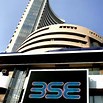Bombay Stock Exchange: GST Will Spur 1,000 Listings
The introduction of a single nationwide goods and services tax (GST) may have an unexpected consequence: prompting more companies to sell shares to the public.
That’s the view of Ashishkumar Chauhan, chief executive officer of BSE Ltd., the operator of the Bombay Stock Exchange. He says smaller firms that become tax-compliant due to the levy, scheduled for implementation on July 1, will be more inclined to go public because they’ll no longer have anything to hide. Some 1,000 companies will list on his bourse over the next four years, he estimates.
Investors and analysts have been debating how the country’s biggest tax overhaul since independence in 1947 will impact the country’s markets, with some predicting that the GST will face teething problems. While the levy is widely projected to boost government revenue and increase the ease of doing business in the world’s largest democracy, attention is also focusing on less obvious outcomes of Prime Minister Narendra Modi’s policy.
Once the landmark tax takes effect, an estimated 51 million smaller firms that currently do much of their business in cash will have to keep digital records, making it harder for them to under-report revenue. That means there will no longer be an incentive for them to avoid listing, Chauhan said.
BSE aims to help companies raise $100 billion annually over the next four years from initial and secondary offerings of stocks and bonds, up from the present $30 billion a year. The exchange, which traces its roots to the 1850s, is also seeking to increase its registered investor base to 100 million people in five years from the present 34 million.
Mumbai-based BSE is focusing on cash equities after failing to gain market share in equity derivatives. BSE has a market share of about 15 percent for derivatives trading, compared with about 85 percent for the National Stock Exchange of India Ltd.
BSE, which itself went public in February, gets about 20 percent of its revenue from listings, according to the exchange. Its shares have risen 33 percent since their debut, versus a 17 percent gain for the benchmark S&P BSE Sensex.
For Chauhan, who’s led BSE since 2012, the positive side-effect he expects from the sales tax will support the bourse in a market dominated by its larger peer.
Kindly send reply or comments on this topic to [email protected]
Source: Ndtv




